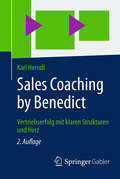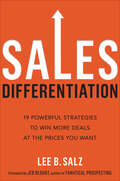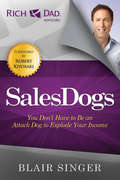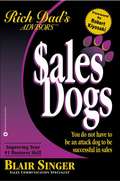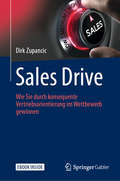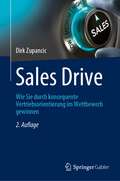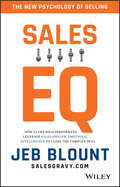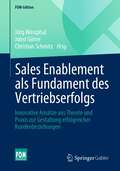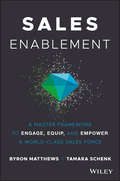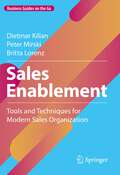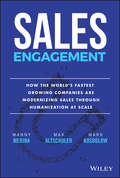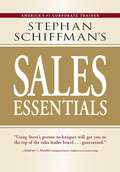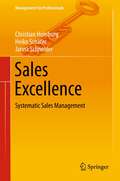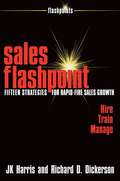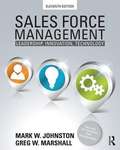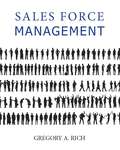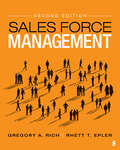- Table View
- List View
Sales Coaching by Benedict
by Karl HerndlWer Ordnung hat, hat auch Erfolg. Klare Strukturen und ganzheitliche Organisation gepaart mit Menschlichkeit dienen der Bündelung der Kräfte - und damit der nachhaltigen Zielerreichung. Nach diesen Grundsätzen lebt der Benediktinerorden seit vielen Jahrhunderten. Doch die Benediktsregel hat nicht nur im Kloster ihren Platz. Sie kann ebenso für die Optimierung von Vertriebsprozessen angewandt werden - und liefert überraschende Ergebnisse. Wie das gelingt, wird in diesem Buch deutlich. Der Autor Karl Herndl überträgt die Grundkonstanten der Benediktsregel auf den Vertrieb und gibt direkt umsetzbare Antworten auf konkrete Fragestellungen: Wie entwickelt man eine Ordnung, in der Umsätze langfristig wachsen? Wie schaffen Führungskräfte eine Kultur der gegenseitigen Wertschätzung? Welche Konstanten sind für erfolgreiche Verkaufs- und Führungsgespräche notwendig? Als Fallbeispiel dient der Coaching-Prozess eines renommierten Versicherungsunternehmens, das vom Autor erfolgreich betreut wurde. Die hier eingeführte ,,Sales-Ordnung" kann auf alle Branchen übertragen werden kann. ,,Herndl ordnet den Tagesablauf der Verkäufer und Führungskräfte im Vertrieb, schafft eine Kultur der gegenseitigen Wertschätzung und gleichzeitig ein verlässliches Erreichen der vereinbarten Vertriebsergebnisse. " Dr. Notker Wolf, Abtprimas des Benediktinerordens ,,Karl Herndl zeigt Führungskräften, WIE man führt. Ganzheitliches Denken und Organisieren und dies mit der Fokussierung auf die Grundlagen und das Tun, das macht die Botschaften dieses Buches wertvoll. " Michael Rentmeister, CEO, OVB Holding AG
Sales Compensation Vignettes
by Frank V. CespedesThis case study is comprised of two vignettes about startup companies considering whether and how to change their sales compensation plans. ElMenus.com is a restaurant app venture in Egypt seeking to lower customer churn while confronting new competition. BigBelly is a “smart” waste receptacle venture that is changing its business model. The case allows for the comparison and contrast of the roles of sales compensation in different ventures with different sales funnel activities. The case also allows for an overview of all the core components of sales compensation.
Sales Differentiation: 19 Powerful Strategies to Win More Deals at the Prices You Want
by Lee B. Salz"If we don't drop our price, we will lose the deal." That's the desperate cry from salespeople as they try to win deals in competitive marketplaces. While the easy answer is to lower the price, the company sacrifices margin--oftentimes unnecessarily.To win deals at the prices you want,the strategy needed is differentiation. Most executives think marketing is the sole source of differentiation. But what about the sales function of the company? This commonly neglected differentiation opportunity provides a multitude of ways to stand out from the competition. This groundbreaking book teaches you how to develop those strategies.In Sales Differentiation, sales management strategist, Lee B. Salz presents nineteen easy-to-implement concepts to help salespeople win deals while protecting margins. These concepts apply to any salesperson in any industry and are based on the foundation that "how you sell, not just what you sell, differentiates you." The strategies are presented in easy-to-understand stories and can quickly be put into practice. Divided into two sections, the "what you sell" chapters help salespeople:Recognize that the expression "we are the best" causes differentiation to backfire.Avoid the introspective question that frustrates salespeople and ask the right question to fire them up.Understand what their true differentiators are and how to effectively position them with buyers.Find differentiators in every nook and cranny of the company using the six components of the "Sales Differentiation Universe."Create strategies to position differentiators so buyers see value in them.The "how you sell" section teaches salespeople how to provide meaningful value to buyers and differentiate themselves in every stage of the sales process. This section helps salespeople:Develop strategies to engage buyers and turn buyer objections into sales differentiation opportunities.Shape buyer decision criteria around differentiators.Turn a commoditized Request for Proposal (RFP) process into a differentiation opportunity. Use a buyer request for references as a way to stand out from the competition.Leverage the irrefutable, most powerful differentiator...themselves.Whether you've been selling for twenty years or are new to sales, the tools you learn in Sales Differentiation will help you knock-out the competition, build profitable new relationships, and win deals at the prices you want.
Sales Dogs
by Blair SingerThe number one skill for any entrepreneur or business owner is the ability to sell. Why? Because sales = income. Yet, many fail financially not because they do not have great ideas or even good work ethic, but typically because they don't know how to, refuse to, are afraid to, or don't think it is important to know how to sell. SalesDogs was written as the very first of the Rich Dad Poor Dad "how-to" Advisory series to teach in a very fun and impactful way how to overcome the fears, the myths and the obstacles to selling your products, services or yourself. It then teaches a simple, time-proven process of selling that will generate great income in most any business. The reader will learn the five most important selling skills to master, how to overcome any objection, manage a territory and much more.The book quickly de-bunks the idea that you have to be an overly aggressive "attack dog" to be successful. It uses the metaphor of "man's best friend" to say that a great sales person is like a loyal, persistent and lovable canine. It stipulates that there are five different "breeds" or personalities of SalesDogs that can each make a lot of money by playing to its strength. You will learn how to identify, maximize and train to that strength and also how to teach others on your team to do the same.While the book is fun and engaging, it also dives deep into the personal development issues that block a person's ability to generate income and how to overcome them. The book is perfect for first time salespeople, individuals who are uncomfortable with the notion of "selling", those who need to train others to sell and those who want to simply get better quicker.
Sales Dogs: You Do Not Have to Be an Attack Dog to Be Successful in Sales (Rich Dad Advisor's Series)
by Robert T. Kiyosaki Blair SingerSALESDOGS reveals how knowing the characteristics and interactions of the five basic 'breeds' of people will be sure to help anyone improve their business and selling savvy. Different workers have the personality traits of different breeds of dogs. This is the idea behind SALESDOGS, a clever business book in which sales expert Blair Singer reveals how anyone can learn what their natural strengths and weaknesses are in order to achieve best possible results. With information on a variety of sales topics-from dealing with 'big dogs' to protecting one's territory-SALESDOGS is a fun new way of looking at the sales game.
Sales Drive: Wie Sie durch konsequente Vertriebsorientierung im Wettbewerb gewinnen
by Dirk ZupancicDieses Buch richtet sich an alle, die im Vertrieb mehr bewegen wollen. Die digitale Disruption stellt viele Unternehmen vor große Herausforderungen, bietet aber auch die Chance, sich ganz neu zu definieren, sich strategisch zu differenzieren und sich damit die Pole Position im Wettbewerb zu sichern.Sales Drive bezeichnet in diesem Zusammenhang das kontinuierliche Streben von Personen und Unternehmen, durch konsequente Kundenorientierung und höchste Professionalität im Vertrieb klare Wettbewerbsvorteile zu erzielen und dadurch ein nachhaltiges und profitables Wachstum zu erreichen. Dirk Zupancic zeigt, wie und warum sich die Rolle des Vertriebs in Zeiten der Globalisierung und Digitalisierung vom Absatzmittler zum entscheidenden Wettbewerbsfaktor gewandelt hat und weiter wandeln wird. Um in diesem dynamischen Umfeld erfolgreich zu sein, müssen wachstumsorientierte Vertriebsstrategien entwickelt werden, die den Vertrieb in den Bereichen Key Account Management, Value Selling und Lean Selling neu ausrichten. Das gesamte Unternehmen muss als Sales Driven Company den Rahmen für Sales Drive schaffen. Die Menschen im Vertrieb müssen zu echten Sales Driven People werden, um den neuen Anforderungen gerecht zu werden. Eine besondere Verantwortung weist Dirk Zupancic dabei den Führungskräften im Vertrieb zu. Sie erhalten grundlegende Hinweise und inspirierende Impulse zur professionellen Führung und zum systematischen Management ihrer Mannschaft. Darüber hinaus bietet jedes Kapitel konkrete Handlungsempfehlungen. Das Ziel dieses Buches ist Ihr Erfolg in der Praxis!
Sales Drive: Wie Sie durch konsequente Vertriebsorientierung im Wettbewerb gewinnen
by Dirk ZupancicDieses Buch richtet sich an alle, die im Vertrieb mehr bewegen wollen. Die digitale Disruption und die verschiedenen Krisen in den letzten Jahren stellen viele Unternehmen vor große Herausforderungen. Sie bieten aber auch die Chance, sich ganz neu zu definieren, sich strategisch zu differenzieren und sich damit die Pole Position im Wettbewerb zu sichern.Sales Drive bezeichnet in diesem Zusammenhang das kontinuierliche Streben von Personen und Unternehmen, durch konsequente Kundenorientierung und höchste Professionalität im Vertrieb klare Wettbewerbsvorteile zu erzielen und dadurch ein nachhaltiges und profitables Wachstum zu erreichen. Dirk Zupancic zeigt, wie und warum sich die Rolle des Vertriebs in Zeiten der Globalisierung und Digitalisierung vom Absatzmittler zum entscheidenden Wettbewerbsfaktor gewandelt hat und weiter wandeln wird. Um in diesem dynamischen Umfeld erfolgreich zu sein, müssen wachstumsorientierte Vertriebsstrategien entwickelt werden, die den Vertrieb in den Bereichen Key Account Management, Value Selling und Lean Selling neu ausrichten.Eine besondere Verantwortung weist Dirk Zupancic dabei den Führungskräften im Vertrieb zu. Sie erhalten grundlegende Hinweise und inspirierende Impulse zur professionellen Führung und zum systematischen Management ihrer Mannschaft. Darüber hinaus bietet jedes Kapitel konkrete Handlungsempfehlungen.In der 2., überarbeiteten und erweiterten Auflage wurden alle Kapitel auf den Prüfstand gestellt und aktuelle Themen wie „Hybrider Verkauf, Social Selling und Remote Selling“ (Kapitel 11) und „Krisenbewältigung“ (Kapitel 12) aufgenommen. Das Kapitel 5 „Sales Driven Leadership“ wird um das neue Konzept des Autors „Führen mit Courage“ erweitert.
Sales EQ: How Ultra High Performers Leverage Sales-Specific Emotional Intelligence to Close the Complex Deal
by Jeb BlountThe New Psychology of Selling The sales profession is in the midst of a perfect storm. Buyers have more power—more information, more at stake, and more control over the sales process—than any time in history. Technology is bringing disruptive change at an ever-increasing pace, creating fear and uncertainty that leaves buyers clinging to the status quo. Deteriorating attention spans have made it difficult to get buyers to sit still long enough to “challenge,” “teach,” “help,” give “insight,” or sell “value.” And a relentless onslaught of “me-too” competitors have made differentiating on the attributes of products, services, or even price more difficult than ever. Legions of salespeople and their leaders are coming face to face with a cold hard truth: what once gave salespeople a competitive edge—controlling the sales process, command of product knowledge, an arsenal of technology, and a great pitch—are no longer guarantees of success. Yet this is where the vast majority of the roughly $20 billion spent each year on sales training goes. It’s no wonder many companies are seeing 50 percent or more of their salespeople miss quota. Yet, in this new paradigm, an elite group of top 1 percent sales professionals are crushing it. In our age of technology where information is ubiquitous and buyer attention spans are fleeting, these superstars have learned how to leverage a new psychology of selling—Sales EQ—to keep prospects engaged, create true competitive differentiation, as well as shape and influence buying decisions. These top earners are acutely aware that the experience of buying from them is far more important than products, prices, features, and solutions. In Sales EQ, Jeb Blount takes you on an unprecedented journey into the behaviors, techniques, and secrets of the highest earning salespeople in every industry and field. You’ll learn: How to answer the 5 Most Important Questions in Sales to make it virtually impossible for prospects to say no How to master 7 People Principles that will give you the power to influence anyone to do almost anything How to shape and align the 3 Processes of Sales to lock out competitors and shorten the sales cycle How to Flip the Buyer Script to gain complete control of the sales conversation How to Disrupt Expectations to pull buyers towards you, direct their attention, and keep them engaged How to leverage Non-Complementary Behavior to eliminate resistance, conflict, and objections How to employ the Bridge Technique to gain the micro-commitments and next steps you need to keep your deals from stalling How to tame Irrational Buyers, shake them out of their comfort zone, and shape the decision making process How to measure and increase you own Sales EQ using the 15 Sales Specific Emotional Intelligence Markers And so much more! Sales EQ begins where The Challenger Sale, Strategic Selling, and Spin Selling leave off. It addresses the human relationship gap in the modern sales process at a time when sales organizations are failing because many salespeople have never been taught the human skills required to effectively engage buyers at the emotional level. Jeb Blount makes a compelling case that sales specific emotional intelligence (Sales EQ) is more essential to success than education, experience, industry awareness, product knowledge, skills, or raw IQ; and, sales professionals who invest in developing and improving Sales EQ gain a decisive competitive advantage in the hyper-competitive global marketplace. Sales EQ arms salespeople and sales leaders with the tool
Sales Enablement als Fundament des Vertriebserfolgs: Innovative Ansätze aus Theorie und Praxis zur Gestaltung erfolgreicher Kundenbeziehungen (FOM-Edition)
by Christian Schmitz Jörg Westphal Jobst GörneKomplexität und Geschwindigkeit in den Kundenbeziehungen stellen große Herausforderungen an Vertriebsorganisationen. Ein Schwerpunkt der Vertriebsforschung liegt daher bisher auf den Konzepten und Werkzeugen für das "Front End", d.h. diese Kundenbeziehungen z. B. durch professionelles Verhandlungsmanagement, oder durch neue Vertriebskonzepte wie Challenger Sales erfolgreich gestaltet werden. Vernachlässigt wurde aber die Frage, welche Enabler im Hinblick auf Technologie, Inhalte oder auch für die Vertriebsmitarbeiter selbst geschaffen werden müssen, damit diese erfolgreich am Front-end wirken können (Peterson und Dover 2020, Rangarajan 2020).Dies ist die Domäne des Sales Enablement. Empirische Studien (CSO Insights 2016, 2018) zeigen, dass Unternehmen einen besseren Verkaufserfolg erzielen, wenn sie Sales Enablement Programme einsetzen. Noch ist die Industrie weit davon entfernt, Sales Enablement flächendeckend einzusetzen, offenbar zeigen nur 60% aller Unternehmen Interesse an einem solchen Ansatz, aber die Zahl steigt. "Sales Enablement als Fundament des Vertriebserfolgs" hat nun das Ziel, aktuelle Erkenntnisse aus der Forschung und Unternehmenspraxis aufzuzeigen, die dem Anspruch an ein Best Practice Sales Enablement gerecht werden, aber auch Impulse für weitere Forschung in diesem noch jungen Themenfeld zu geben. Damit leistet dieses Buch einen wichtigen Beitrag für die angewandte Vertriebsforschung und die praktische Gestaltung erfolgreicher Kundenbeziehungen.
Sales Enablement: A Master Framework to Engage, Equip, and Empower A World-Class Sales Force
by Byron Matthews Tamara SchenkPut buyer experience and selling resources front-and-center to boost revenue Sales Enablement is the essential guide to boosting revenue through smarter selling. A thorough, practical introduction to sales enablement best practices, this book provides step-by-step approaches for implementation alongside expert advice. In clarifying the sales enablement space and defining its practices, this invaluable guidance covers training, content, and coaching using a holistic approach that ensures optimal implementation with measureable results. Case studies show how enablement is used effectively in real-world companies, and highlight the essential steps leaders must take to achieve their desired sales results. Smarter buyers require smarter selling, and organizations who have implemented enablement programs attain revenue goals at a rate more than eight percent higher than those that do not. This book provides a 101 guide to sales enablement for any sales professional wanting to enhance sales and boost revenue in an era of consumer choice. Understand sales enablement and what it can do for your company Implement enablement using techniques that ensure sustainable, measureable performance impact Adopt proven best practices through step-by-step advice from experts Examine case studies that illustrate successful implementation and the impact of sales enablement on revenue Consumers are smarter, more connected, and more educated than ever before. Traditional sales strategies are falling by the wayside, becoming increasingly less effective amidst the current economic landscape. Companies who thrive in this sort of climate know how to speak to the customer in their own terms, and sales enablement keeps the customer front-and-center by providing sales people with the resources buyers want. Sales Enablement provides a scalable, sales-boosting framework with proven results.
Sales Enablement: Tools and Techniques for Modern Sales Organization (Business Guides on the Go)
by Dietmar Kilian Peter Mirski Britta LorenzThis book helps in building an optimally designed and customer-oriented sales organization. It places a special emphasis on purchasing decisions and leads to producing a decisive competitive advantage. The focus is on the sales enablement process as a holistic framework concept. It forms the infrastructure that ensures efficient cooperation between all areas of the company. The book explains the alignment of all goals, motivations, thought patterns, actions and campaigns in relation to the needs of the customer. In addition, it shows the most promising methods and approaches and how the practical start of sales enablement can look like. The book is aimed at managers and all who deal with sales strategies.
Sales Engagement: How The World's Fastest Growing Companies are Modernizing Sales Through Humanization at Scale
by Max Altschuler Manny Medina Mark KosoglowEngage in sales—the modern way Sales Engagement is how you engage and interact with your potential buyer to create connection, grab attention, and generate enough interest to create a buying opportunity. Sales Engagement details the modern way to build the top of the funnel and generate qualified leads for B2B companies. This book explores why a Sales Engagement strategy is so important, and walks you through the modern sales process to ensure you’re effectively connecting with customers every step of the way. • Find common factors holding your sales back—and reverse them through channel optimization • Humanize sales with personas and relevant information at every turn • Understand why A/B testing is so incredibly critical to success, and how to do it right • Take your sales process to the next level with a rock solid, modern Sales Engagement strategy This book is essential reading for anyone interested in up-leveling their game and doing more than they ever thought possible.
Sales Essentials
by Stephan SchiffmanPacked with insider information you need to beat the competition, you can't afford not to read Stephan Schiffman's Sales Essentials!
Sales Excellence
by Christian Homburg Heiko Schäfer Janna SchneiderThis book presents a very novel and strategic approach to Sales Management, an area that has suffered from a lack of sophistication in practice. This content-rich and thought-provoking book has a very unique positioning: It considers the sales performance of an organization at a very high, strategic level and offers specific guidance in managing not just a few direct reports but an entire organization?s sales function. The book includes many useful tools and guidelines and is enhanced with numerous examples that help bring the concepts to life and make them very approachable for the trade market. A checklist-based scoring system that is utilized throughout the book allows readers to specifically evaluate their own company as well as to track its progress as concepts are applied over time. This work is an essential resource and thought-provoking read for ambitious Sales Managers, including CEO-level executives.
Sales Flashpoint
by Jk Harris"A well-researched book, packed with strategies and tactics that can be implemented and will move the needle quickly-regardless of the industry in which you sell. A must read!" Tom Nightingale, Vice President, Communications and Chief Marketing Officer, Con-way, Inc. Successful entrepreneur JK Harris and sales expert Richard D. Dickerson reveal fifteen proven strategies that put your business on the fast track to higher sales and greater profits. Whether you are a business owner, sales manager, or sales rep, you'll learn how to: Identify, hire, and train high sales achievers to power your growth Lock in positive sales results before you even make your first call Negotiate strategies to generate win-win deals Create long term, profitable client relationships Create a sales environment that fosters teamwork and cooperation Nurture and retain top sales performers Succeed in sales-hire the right sales people, train for maximum performance, and inspire unbelievable results!
Sales Force Integration at FedEx (A)
by David B. GodesFederal Express' (FedEx) recent acquisition of RPS--a ground delivery firm--gave the firm the potential to offer a single source for a client's delivery needs. However, to deliver on this potential, the firm needed to deliver the integrated solution through a single sales force. This integration required the solution of many issues, none more important than the formulation of a new compensation plan that not only determined the sales force's effort but also served as a medium through which FedEx communicated its expectations to the salespeople. Jerry Beyl headed the committee charged with making recommendations on the compensation and training the new sales force. The compensation plan needed to encourage salespeople to sell both products. Complicating matters was the fact that the two organizations' cultures were radically different.
Sales Force Integration at FedEx (B)
by David B. GodesAn abstract is not available for this product.
Sales Force Integration at FedEx (C)
by David B. GodesAn abstract is not available for this product.
Sales Force Integration at FedEx (D)
by David B. GodesAn abstract is not available for this product.
Sales Force Management
by Greg W. Marshall Mark W. JohnstonIn this latest edition of Sales Force Management, Mark Johnston and Greg Marshall continue to build on the tradition of excellence established by Churchill, Ford, and Walker, solidifying the book's position globally as the leading textbook in the field. It's a contemporary classic, fully updated for modern sales management practice. Including the Churchill, Ford, and Walker approach, the new edition also features: A strong focus on leadership, technology, innovation, ethics, and global business New material integrated throughout the book on multifaceted sales communication approaches, leadership, and the relationship between the marketing and sales functions Continued partnership with HR Chally, a global sales consultancy that supplies cutting-edge data for each chapter, allowing students to benefit from understanding and working with real-world applications of current sales force challenges Enhanced learning features, such as short and long cases to stimulate discussion, leadership challenges to assess students' ability to make decisions, role plays to allow students to learn by doing, and more Further resources for instructors and students are available at www.routledge.com/cw/johnston-9780415534628 .
Sales Force Management
by Gregory A. RichFormerly published by Chicago Business Press, now published by Sage Written in an engaging and student-friendly manner, Sales Force Management provides a blend of cutting-edge research and practical strategies. Author Gregory A. Rich delves into the challenges faced by today′s sales managers, covering topics such as technology, globalization, and social selling, keeping your students up-to-date with the latest developments in the field.
Sales Force Management
by Gregory A. RichFormerly published by Chicago Business Press, now published by Sage Written in an engaging and student-friendly manner, Sales Force Management provides a blend of cutting-edge research and practical strategies. Author Gregory A. Rich delves into the challenges faced by today′s sales managers, covering topics such as technology, globalization, and social selling, keeping your students up-to-date with the latest developments in the field.
Sales Force Management
by Gregory A. Rich Rhett T. EplerFormerly published by Chicago Business Press, now published by Sage Sales Force Management is a comprehensive guide to leading sales teams in today′s dynamic business landscape, offering practical insights, strategies, and tools to navigate the challenges of modern sales management effectively. The Second Edition also delves into how technology, such as artificial intelligence, is reshaping sales force operations in the post-pandemic era.
Sales Force Management
by Gregory A. Rich Rhett T. EplerFormerly published by Chicago Business Press, now published by Sage Sales Force Management is a comprehensive guide to leading sales teams in today′s dynamic business landscape, offering practical insights, strategies, and tools to navigate the challenges of modern sales management effectively. The Second Edition also delves into how technology, such as artificial intelligence, is reshaping sales force operations in the post-pandemic era.
